Education and Intergenerational Social Mobility in Europe and the United States

This volume examines the role of education in shaping rates and patterns of intergenerational social mobility among men and women during the twentieth century. Focusing on the relationship between a person's social class and the social class of his or her parents, each chapter looks at a different country—the United States, Sweden, Germany, France, the Netherlands, Italy, Spain, and Switzerland. Contributors examine change in absolute and relative mobility and in education across birth cohorts born between the first decade of the twentieth century and the early 1970s. They find a striking similarity in trends across all countries, and in particular a contrast between the fortunes of people born before the 1950s, those who enjoyed increasing rates of upward mobility and a decline in the strength of the link between class origins and destinations, and later generations who experienced more downward mobility and little change in how origins and destinations are linked. This volume uncovers the factors that drove these shifts, revealing education as significant in promoting social openness. It will be an invaluable source for anyone who wants to understand the evolution of mobility and inequality in the contemporary world.
"Breen and Müller confront the belief that equalizing opportunity can solve Western nations' problems with inequality. Their sophisticated analysis shows why equalizing opportunity may be good in itself but is not the solution to today's problems. Western nations must confront rising inequalities in employment, income, and political voice directly and soon."—Michael Hout, New York University
"In this book, first-rate scholars show how social mobility among women and men has changed in the twentieth century, and how this change was influenced by educational expansion and by changes in the association between social origin and education. Their reliable analyses will be of great value to professionals and political actors with interest in social mobility and educational attainment."—Robert Erikson, Swedish Institute for Social Research, Stockholm University
"What sets Education and Intergenerational Social Mobility in
Europe and the United States apart from previous, less empirical,
discussions is the way the bigger picture emerges from an analysis of large datasets....The book is methodologically rigorous, heavily referenced and data-rich, incorporating many detailed tables and graphs."—Veronica Coram, Interngenerational Justice Review




